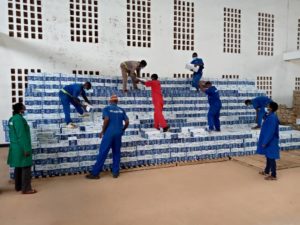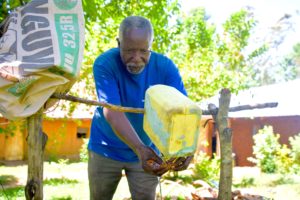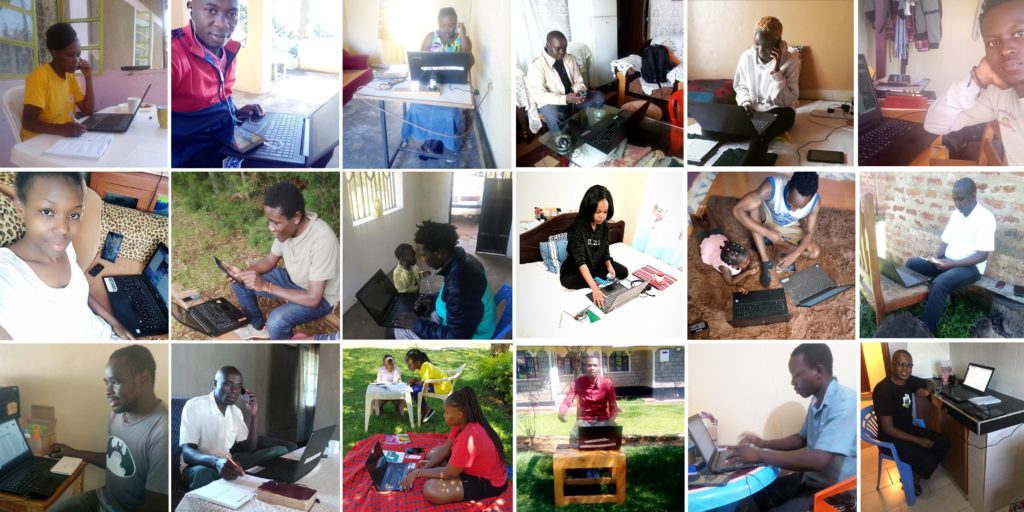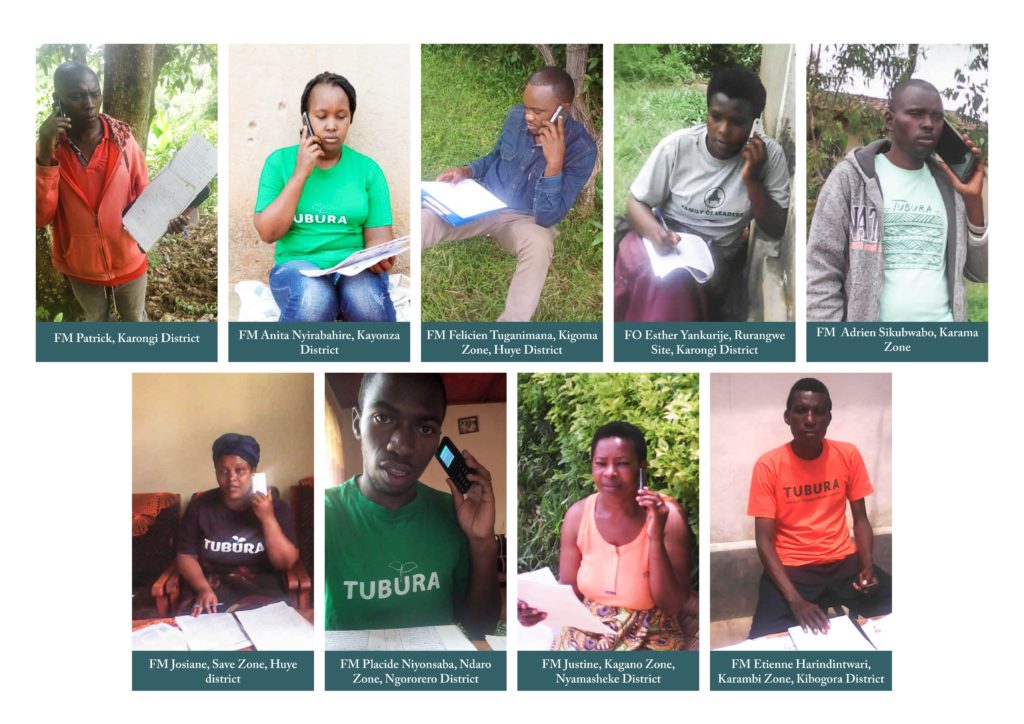For Africa’s smallholder farm families, COVID-19 poses risks of a dual health and food security crisis
Most of our nations in East Africa rely on food produced by smallholder farmers, and we simply cannot afford to compound a health crisis with a food crisis.
Good health relies on good harvests—and 1 million farmers rely on One Acre Fund. Our mission has never been clearer: we must help farmers grow enough food to feed their families and feed their communities. We will continue to serve farmers for as long as we can do so safely and responsibly.
At the same time, how we do the work we do must change significantly. We pride ourselves on meeting farmers in their fields, and providing one-on-one customer service—all of which is up for reinvention.
In this uncertain time, food security is more essential than ever. We’re rapidly reinventing our services to keep farmers safe and well-supported in the era of social distancing. When movement was restricted, our field team in Rwanda continued working from home and serving farmers by phone.
As the virus spreads beyond Africa’s urban centers, it threatens to infect a large share of rural populations. Conditions in these communities are uniquely high-risk: Water and sanitation infrastructure is low, the prevalence of malnutrition and diseases like malaria and HIV create increased vulnerability for individuals, and under-developed health systems stand to be quickly overwhelmed.
Looking further ahead, the ripple effects of COVID are laying the groundwork for a regional food crisis. Restricted movement will decrease marketing and selling of farm produce, market closures will substantially lower opportunities for smallholders to generate non-farm income, and increased health costs will deplete household dollars. Smallholder families already experience high levels of food insecurity; these compounding factors will make it increasingly difficult for farmers to invest in farm production or purchase food for their families and children.

Every aspect of One Acre Fund operations is changing to address this dual threat head-on. We believe that early and strong intervention could make a significant difference for vulnerable farm families.
- Health response: To slow the spread of the virus, we have rolled out mass soap distribution and hand-washing guides to our 1.1M client families, video trainings on building community hand-washing stations with local materials, and safe in-person trainings to clients and frontline staff on social distancing.
- Food security response: After accelerating input deliveries at the initial signs of COVID spread, we are now shifting to proven methods for providing remote farm production services to our clients. We are replacing group farm trainings with video trainings, reference cards, and 1:1 field officer visits at safe distance, and we are accelerating the digitization of our core model — leveraging heavy use of SMS and USSD messaging, remote training, and significant scale-up of phone communication.
Our teams are working around the clock to reimagine our operations in ways that incorporate government guidance on meeting size, hand washing, and social distancing. To give you a glimpse of how we’re adapting around COVID-19, here are a few updates from our operations in Kenya and Rwanda:
Kenya: 408,000 farmers served
Faster Deliveries:
When the first confirmed COVID-19 case was reported in Kenya, we were in the middle of our delivery season. During this time, we deliver key farming supplies, such as seed and fertilizer, along with other life-improving products like solar lights, to the rural locations where farmers live. When the news came, we still needed to deliver to 175,000 clients and had planned for those deliveries to take 25 days. Given the likelihood of future restrictions on movement, we knew time was limited.
Within eight hours of hearing about the first confirmed case, we found ways to scale our distribution network (quickly sourcing hundreds more delivery trucks and fast-tracking clearance of crucial inputs from the port), and our teams were able to cut this delivery window to nine days – completing the final delivery on March 24. This means all of the farmers working with us in Kenya now have the tools and supplies they need to continue producing food over the coming months.
Staying Safe:

Our team has been doing our part to #FlattenTheCurve by integrating government and World Health Organization recommendations on COVID-19 preventive measures into our work:
- Remote Working: In the past week, we have pivoted to working from home in all of our offices across the country, and adjusted our operations to function remotely.
- Safe Deliveries: We followed safety practices during our deliveries by texting farmers directions to designated small group pickup points to avoid crowding, setting up handwashing stations at each pickup point, and ensuring each delivery truck only visited one area each day.
- COVID-19 Education: We are training farmers on how to limit the spread of COVID-19 within their communities by adopting WHO best practices.
- Customer Service: Our customer hotline team, which typically works from our Kakamega headquarters, quickly set up a way to work from home. In the team’s first week of working remotely, they answered thousands of calls while maintaining high-quality customer service.

Members of our Customer Engagement team in Kenya share their remote working set-ups as they continue to serve our clients.
Rwanda: 383,000 farmers served
- Reimagining Field Service: In Rwanda our field officers, who would typically be out meeting farmers in-person, were asked to work from home last week. We had never considered what that would look like prior to this. But, as Leonce Ngaboyakema, one of our operational team leaders put it, “With field officers working from home last week, we had 1,159 more ‘hotline operators’ to serve farmers over the phone.” Our field team continued to stay in touch with the farmers we serve by calling them, answering their questions, and offering crucial support virtually.
- Arming Staff with Technology: Just 72 hours after the first confirmed COVID-19 case was reported in Rwanda, we distributed 685 smartphones to our field staff, allowing the field team to begin digital trainings, create WhatsApp groups for virtual communications, and find new ways to stay connected without a physical weekly meeting.
- Government Relations: Government support has been critical to ensure we can continue serving farmers while staying safe ourselves. Our seed processing, tree nursery, and rural retail operations were designated as “essential services” by the government, which allowed them to remain operational, with advanced health protocols in place.
- USSD Enrollment: Last season, 45% of our clients in Rwanda enrolled via USSD (a text messaging-like functionality that’s possible on basic phones) as opposed to using paper contracts, as we historically have done. Thanks to our field operations and systems teams, we’re now ready to move to 100% USSD enrollment for next season. This is a big step toward empowering farmers, and it allows farmers to place their orders no matter what travel or movement restrictions may be in place.

When movement was restricted, our field team in Rwanda continued working from home and serving farmers by phone.
We know that many challenges are still to come, but it is essential that we continue serving farmers. To borrow a saying from our Tanzania team, we’ll find our way forward in this critical time with a cool head, a warm heart, and clean hands. Food security remains essential for our global community’s health, so we will continue to rally our teams around our motto, Farmers First. Stay safe everyone.
You can read more about One Acre Fund here, and support their work here.






